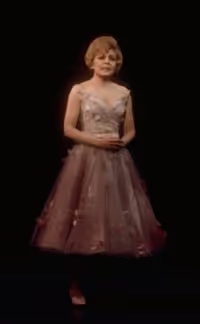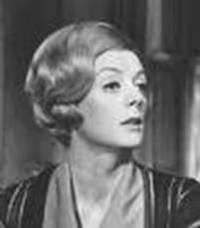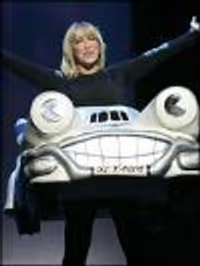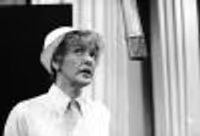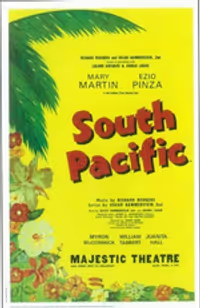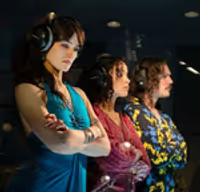CAROUSEL (2018) Previews
Dover
Leading Actor Joined: 4/29/06
#200CAROUSEL (2018) Previews
Posted: 3/1/18 at 11:47am
Are you guys saying they made musical cuts or re-ordered parts of the Carousel Waltz?
I haven't seen the show, and I can keep an open mind about just about anything. But hell-to-the-no if they touched one note of that.
#201CAROUSEL (2018) Previews
Posted: 3/1/18 at 11:50am
I completely agree, Michael Bennett. They're dancing around the casting and trying to play both sides. In the end, the entire show feels like this: muddled, diluted, and ill-concieved.
#202CAROUSEL (2018) Previews
Posted: 3/1/18 at 12:00pm
I had a terrible feeling about that from the beginning: that a black Billy would either be scrubbed clean of some of the character's darkness, or would become a racialized monster if presented as traditionally played in a mostly-white world. Perhaps, outside of a heavily conceived "statement" production, there's no way to do both Carousel right and "black Billy" right, because the baggage on both sides is so precariously balanced.
It's why, though I believe in both colorblind and color-conscious casting, I would be deeply uneasy watching a black Pierpont Finch in "How to Succeed." Moments and traits that seem winking and harmless on a white Finch would seem like insidious old racial stereotypes reborn on a black Finch.
#203CAROUSEL (2018) Previews
Posted: 3/1/18 at 12:01pm
DAME said: "Interesting how some revivals get it so right and some get it so wrong. I was worried this would be another dissatisfying affair like Fiddler."
If you're referring to the most recent revival directed by Bartlett Sher, that production was actually pretty well-received.
#204CAROUSEL (2018) Previews
Posted: 3/1/18 at 12:12pm
Jeffrey Karasarides said: "DAME said: "Interesting how some revivals get it so right and some get it so wrong. I was worried this would be another dissatisfying affair like Fiddler."
If you're referring to the most recent revival directed by Bartlett Sher, that production was actually pretty well-received."
I am. It was dull and joyless. And it was a financial flop.
#205CAROUSEL (2018) Previews
Posted: 3/1/18 at 12:15pm
Well, you can't please everybody. At least that production will be launching a national tour this fall.
#206CAROUSEL (2018) Previews
Posted: 3/1/18 at 12:16pm
Jeffrey Karasarides said: "Well, you can't please everybody. At least thatproduction will be launching a national tour this fall."
With that awful framing device? Yuck.
#207CAROUSEL (2018) Previews
Posted: 3/1/18 at 12:17pm
"At least that production will be launching a national tour this fall."
And only two years after the production shuttered. I didn't know that was a hallmark of success. Like Amazing Grace and Soul Doctor?
#208CAROUSEL (2018) Previews
Posted: 3/1/18 at 12:28pm
There were black actors who understudied and performed as Billy in the RNT production both in the U.K. and NYC and I don’t believe race ever became an issue. But again, that production was more abstract than what is on Broadway now, and had a truly diverse palette, with people of color playing (at one time or another) each of the principal roles.
I do feel like there perhaps wasn’t an ample conversation or cohesive vision on how Mr. Henry’s casting could/ would/ should impact the play as a whole. I’d also like to point out this is the most cookie cutter looking ensemble I’ve seen in a while. I’m not talking about race, for they cover their bases there, but they all have the exact same body type, age etc. it hardly resembles an actual community.
#209CAROUSEL (2018) Previews
Posted: 3/1/18 at 12:28pm
Sally, I disagree with you about color-blind casting. It’s right there in the label- in true color-blind casting we are being asked to be blind to ethnicity of the actor playing the role. It shouldn’t factor into or alter the piece at all. Within the context of Carousel, Carrie really can only be seen as a white woman. Realistically someone as status-obsessed and business-minded as Enoch would not date, let alone marry and have a fleet of children with anyone other than a white woman. I also think it’s 100% wonderful to color-blind cast Carrie and wish more roles were color-blind cast throughout the theater.
The best color-blind casting I’ve ever seen was in Passing Strange, where they delightfully turned the whole concept on its head by casting black actors to play (mostly) white characters.
I do agree with MB that this production hasn’t fully decided whether we are to accept Joshua Henry’s casting as color-blind or if we’re to see him as a black man living in this world.
squeakers1957
Chorus Member Joined: 1/20/10
#210CAROUSEL (2018) Previews
Posted: 3/1/18 at 12:52pm
Does anyone remember what time you got out? I'm seeing it tomorrow night and want to catch an 11:18 train from Penn Station. Thanks in advance.
#211CAROUSEL (2018) Previews
Posted: 3/1/18 at 12:54pm
Hmm about Julie and Billy, I always thought their connection was sort of primal. A bit like Stella and Stanley Kowalski. They are a foil to the practical, passionless union of Carrie and Mr. Snow. I think the issue with Billy/Julie is that except for the bench scene we're only given very fleeting glimpses of the rapidly spiraling marriage. So when Julie remembers Billy in Act 2 and says those famous lines about him hitting her but it not hurting the audience doesn't have much to "remember" with Julie. So directors of Carousel always have to try to get around this, either by getting two actors who have such great chemistry naturally that we get the primal attraction between Billy and Julie, or making the musical seem more romantic than it is.
Owen22
Broadway Legend Joined: 2/24/11
#212CAROUSEL (2018) Previews
Posted: 3/1/18 at 1:14pm
Sally Durant Plummer said: "Argh. Why do people find colorblind casting so hard? Or misinterpret it. Colorblind casting, no matter what the actor or director politically correctively say, is generally a person of color, generally black, PRETENDING to be white! Most of these colorblind shows are set in a very VERY racist past where Mr. Snow would never marry a black woman or an Oklahoma sheriff would never consider marrying a woman of color, no matter if she looks and sings like Audra McDonald. Or maybe even .. a beautiful black woman being.the daughter of two white Victorian Norwegians (even if the mother IS a proto-feminist). We as theatre-goers know that music doesn't just come out of the air and people sing. Or that Mandy Patinkin really isn't Che Guevara come back to life. We are all in a shared two to three hour fantasy world where we all agree to suspend disbelief. I guess Joshua might think he is playing a black man but that belies the truth of the situation and his relationships within the play. And though this IS a fantasy, the truth within the fantasy MUST BE PLAYED. So I watch and love a colorblind show knowing that the fourth wall is turning a black person into a white person by the magic of the theatre. That might sound racist, but in my opinion it's exactly the opposite.
It's all well and good to "ignore" race when reviving certain shows - Hello, Dolly! is a fine example that in my opinion could be taken even further in its current casting stage. But no, I call bullsh!t on the idea that any POC actor playing a character in an old show traditionally played by white people "become" white. That simply is not the case. Every single person, from the tourist, to the musical theatre fanatics, to the schoolchildren, to the tired businessman whose wife dragged him the Imperial, walks in with preconceived notions about the people we are seeing. This is because of the systematic oppression started by Colonialism that the US is built on. It is near impossible to ignore it. And irresponsible.
That is not to say I believe that only white actors should play these parts. On the contrary, we should be examining these roles to see what they play become when we use casting as context. And the current Carousel's context is that the only major POC characters are the only perpetrators of violence. As I said, I think there's something to be dug into here, but this production has not done so. And that was a real failing for me."
How do you then explain Condola Rashad in Dolls House Part 2? Or doesn't it matter as it doesn't take place in colonialist America?
#213CAROUSEL (2018) Previews
Posted: 3/1/18 at 1:20pm
A Doll's House Part Two is deliberately anachronistic.
ScottyDoesn'tKnow2
Broadway Legend Joined: 1/22/14
#214CAROUSEL (2018) Previews
Posted: 3/1/18 at 1:36pm
How do opera audiences deal with productions where the only POC they may see in say I Puritani would be the lead tenor?
#215CAROUSEL (2018) Previews
Posted: 3/1/18 at 2:37pm
For those who were there:
How different do Jonathan Tunick’s orchestrations sound compared to the originals? Those didn’t seem like they needed a revision, but I have no doubt Tunick’s new arrangements sound gorgeous.
(I know DOLLY was re-orchestrated also, but those seemed almost identical to the original, to my untrained ear.)
#216CAROUSEL (2018) Previews
Posted: 3/1/18 at 3:19pm
I agree with the idea that "colorblind casting" is supposed to mean that the character isn't necessarily a specific race, but that someone of said specific race just so happened to be the best pick for the role. I mean, look at productions of Les Mis where they cast a black Eponine and give her nonblack parents with a white girl playing Little Eponine. I'm pretty sure Denée Benton being cast as Natasha didn't mean that Natasha was specifically a black woman, because all races can play the role. Etc., etc. I think we need to just let POC play roles without trying to force painful dynamics on them (racism, oppression, etc.) that aren't really present in the source material they're portraying every time they get cast in a traditionally "white" part.
#217CAROUSEL (2018) Previews
Posted: 3/1/18 at 4:56pm
Whizzer, I would argue that Passing Strange actually very deliberately uses this method of casting, similarly to Churchill's casting in Cloud Nine. Since you know the show much more than I, I'd love to hear your thoughts on this. What would change if you cast Passing Strange according to race - i.e, white actors played white characters? What changes? How does Stew's concept change?
In terms of Carousel, I tink it's fairly obvious that no one thinks these characters could be anything other than white. However, when everyone is white, except Billy and Jigger, this creates a context that is very hard to ignore. Unless audience members are actually blind, then they will take in the race of actors and make their own inferences about it. Casting is context. That is why casting a black Carrie is a much different thing - we see how she married Enoch to improve her station and ends up having a number of children she previously thought to be excessive. Also, from what I've read about that production, it highlighted the "blind" in "colorblind" - wasn't there a line in the review that stated that Enoch and Carrie's children looked like all the colors of the rainbow or something along those lines? In this production, we see two POC actors being the perpetrators of violence on white women (Billy with Julie; Jigger with Carrie, later Billy with Louise) and attempted murderers of a white man. This carries connotations, even if the directors and some on this board think it doesn't. It would be a different ballpark if Enoch wasn't white, or Julie wasn't white, etc. But at this moment, the only non-white characters with large roles are the ones that inflict violence on others. I'm not saying it's a bad conception; it actually might say something really interesting about the way oppression works. But this production seems to have largely ignored it and tries to walk the line of making the audience forget Henry is black. I feel the same way about the H&M ad that ran a month or so ago, featuring a black child wearing a sweatshirt with a gorilla on it. I'm sure the advertises didn't intend to be offensive, they just didn't examine it deeply enough to see the connotations it makes. I feel the same about this production.
Elfuhbuh, I argree that the notion of ignoring race is what "colorblind casing" has come to mean. I personally think that directors should at the very least explore how casting as context might change a show. With Les Miserables the central core of the show is the oppression that a majority of people feel from the state power - the people holding such power are even in the show. So I think it's easier to use casting as context in that show to see how everyone was oppressed by the wealthy lawmakers.
If I seem to be referencing Colonialism a lot, it is just because I find it so related to the events happening around us. For most US people (along with many other counties) in marginalized communities, the power structure enacted in Colonialism never went away, they were just restructured and made subtler, and more nuanced, which are the structures that have kept women, blacks, immigrants, native Americans, the LGBT community, and many, many others oppressed up until today. And I think casing can be used to explore that. That's why I'm quiet on your Great Comet question. I do not know enough about Russian history and power structures to make a claim. All I know is that Dave Molloy chose his cast with the utmost care, so I think it is deliberately anachronistic.
I'm not saying that all shows should deal with this every time we cast someone not white in a role. There are many shows - Hello, Dolly!, She Loves Me, etc. - that are just great fun and everyone deserves a chance to play those roles. I just don think that is true of Carousel, when the only actors of POC are cast as Billy and Jigger.
#218CAROUSEL (2018) Previews
Posted: 3/1/18 at 5:31pmA friend of mine saw it last night. They said it was beautiful, but needed work. Also, the word of mouth on social media is incredibly positive. Weird to see the contrast between those opinions and the ones on here. Do you think it's possible for this production to pull through by opening or is it just hopeless?
#219CAROUSEL (2018) Previews
Posted: 3/1/18 at 5:49pm
That's the thing with live theater, different people have different opinions.
#220CAROUSEL (2018) Previews
Posted: 3/1/18 at 6:02pm
Honestly, judging from the people I heard around me and in line to go in, there were a lot of people primed to love it. People who attend first previews (and, similarly, first performances of major cast changes like Bernadette in Dolly) tend to skew more towards the blindly supportive. Not that there’s anything wrong with that. But I often find unanimous, unadulterated praise and “leaping to their feet” applause has more to do with the audience’s self-satisfaction than any actual reflection of the performance.
That’s not to say there weren’t people who loved what they saw, but a lot of those folks had their minds made up already, I can tell you from eavesdropping.
Dolly80
Broadway Legend Joined: 5/15/11
#221CAROUSEL (2018) Previews
Posted: 3/1/18 at 7:12pmAre you serious?!! That’s clearly a carousel somewhere NOt the show!!!
#222CAROUSEL (2018) Previews
Posted: 3/2/18 at 12:47am
So, there is no carousel? Kind of like the Lincoln Center production of this in 2013? This is a full scale production though, how strange. Can anyone please tell me if they are selling magnets at the booth? Thanks in advance!
#223CAROUSEL (2018) Previews
Posted: 3/2/18 at 12:52am
How is Betsy Wolfe?
Lincoln Center had a Carousel with horses that came from offstage and formed the circle. It was very cool.
#224CAROUSEL (2018) Previews
Posted: 3/2/18 at 12:56am
Betsy is sunning herself in Mexico right now, so I am sure she is awesome! Yeah, I know they formed a circle, but it was not an actual carousel. Bummer.
Videos


